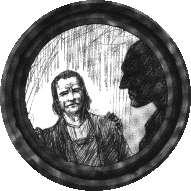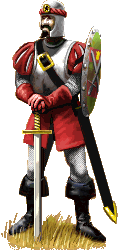
- Militia.
- Click here to return to the main site.
- Recruitment.
- Join the militia today! Visit the recruitment office.
- Contact.
- Need to reach a militia representative?
- Library.
- All the collected knowledge of the militia and the church can be found here.
- Townfolk.
- Find out which people live or serve Stonekeep and the militia.
- Awards.
- A list of official awards, medals and ribbons which a guard can earn.
- Search.
- Cant find something?
- Gatekeeper.
- Login to be able to edit profiles.

|
Creating a Guardsman "So? You too wish to join the Guards? Let me warn you. Our ways are harsh and strict. We promise no wealth, fame nor longevity to our men. In fact, we offer little more than food on the table, gear to help you on the field and peers to aid you in your struggle. I will be honest with you. Not many survive more than a few years within our ranks and even fewer reach glory and fame. Working within the laws limits our men geographically, as well as in their actions. Many die on patrols far off at the borders of our lands. Others are slain in wars on our homelands, and yet others are lost, never to be heard from again. That is why we constantly need new recruits to fill the holes in our ranks. The life of the guardsman is harder than that of most any other profession." - Recruiter Damien The game of Ultima Online is in itself a challenge to master. But here you enter a medieval community with restrictions much greater, and so are the challenges. Following strict rules you must survive in a world where others do not follow them. You must prove yourself to your peers, in combat as well as in leadership in order to gain ranks and respect. You live in constant threat of dangerous powers, from within and without of the Militia. Not all guardsmen are your friends. The Magistrate, with its zealous Inquisitors will stop at nothing to expose you as a Heretic and have you burned at the stake. And from outside the constant menace of the Undead, the Tolag�l orcs, Bandits and Murderers hangs over your head. In other words, a new challenge, and a new community. The Militia will require anyone joining to create a new character. This reflects that only commoners are accepted and not hardened mercenaries or adventurers that are strong enough to question orders given. If you still feel that serving as a Guardsman is something for you, then read on... 1. Reading the Tome Before you become a guardsman, you must learn as much as possible about us. Read the website, and try to grasp it all. Everything after "Divisions" on the left frame can be skipped for now, but the Laws of War and Roleplaying a Guardsman you should know by heart. As you are recruited, there will be a test in knowledge of these pages. "Beat thy thoughts to mould thy mind." - Adjudicator Lithargus 2. Creating the Recruit Try to come up with an interesting and creative personality and a background for your character, but don't overdo the background. 3. Your guardsman All guardsmen in the Militia are unique characters (just as their creators), but to make the roleplaying more enjoyable, they should have visible traits. You must decide upon how your character speaks, acts and create a personality for him or her. And foremostly, you must make it
visible so that others notice, and understand what kind of role you are playing. Note, that because of the (evil) role of Elves in the religion of the Guardsmen, your guard cannot be of the
Elven race. Derivations of the Elven race (half elves, dark elves) are also forbidden. Basically all races other than
Human are mistrusted and might end up in lethal danger merely based on their appearance, so choose wisely. A creature half-cat, half-man would surely be shunned by the majority of guardsmen and hunted down by the Church. Dwarves have been accepted, but only with permission from an
Officer.
4. The Test Go to the Stonekeep Citadel (you may find it on this Map) and tell the guardsmen you're a recruit. If there's a craftsman they may make you a uniform and gear if you look trustworthy. You must now find an Officer or trusted Guard to give you the Test; a set of questions making sure you know how to roleplay a guardsman of the Militia. They will also check you with anatomy to make sure you aren't too strong, and ask you to show your ability of hiding. If you pass, they will forward you to a recruiter, who will have you added to the stone. Remember that all guardsmen must show their character's skills on my.uo.com in order to reveal those that do not hold true to the oath (using Magery and/or advancing "unnaturally" fast in skills and stats). 5. Final Comments
|
Remember them well.
Please help us complete this list if any name is missing.

